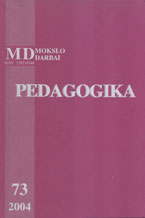Būsimųjų kūno kultūros specialistų ir sporto pedagogų kalba kaip kokybiškos komunikacijos kodas
Future Physical Educator's and Sports Pedagogues' Language as a Code of Qualitative Communication
Author(s): Ligita Mykolaitienė, Ona Laima Gudzinevičiūtė, Laimutė KardelienėSubject(s): Education
Published by: Vytauto Didžiojo Universitetas
Keywords: sports pedagogues; linguistic communication; physical lessons; physical educators; language culture.
Summary/Abstract: At school students' physical education should be related to their feelings and experience. In this case, pedagogical interaction becomes of great importance, linguistic communication being its main means of expression. The dynamics of physical lessons demands from students to speak fluently, briefly and articulately. Consequently, not only the content of the communication during the lessons should be important but the linguistically qualitative way of conveying it as well. The article analyses the future physical educators' and sports pedagogues' language as a code of qualitative communication. The research results show that secondary school graduates' linguistic abilities don't meet the requirements of the academic community because their ignorance of systematic language subjects interferes with the learning of professional language. The research revealed that the future physical educators and sports pedagogues often use the wrong loan translations, verb forms and make other linguistic mistakes that should have been covered and corrected at school. Besides, the comparative analysis revealed that the linguistic communication competence of the first year and the fourth year students' differs: the fourth year students showed better results as they had already done the language culture and the professional language courses. This proves that the module of language culture and professional language practice is essential in professional skill. Moreover, its content and educational technologies should meet the present day needs
Journal: Pedagogika
- Issue Year: 2004
- Issue No: 73
- Page Range: 49-54
- Page Count: 6
- Language: Lithuanian

